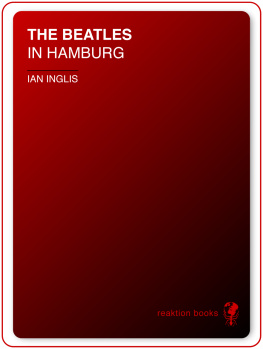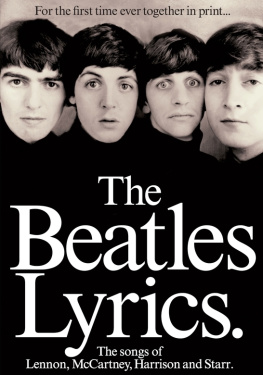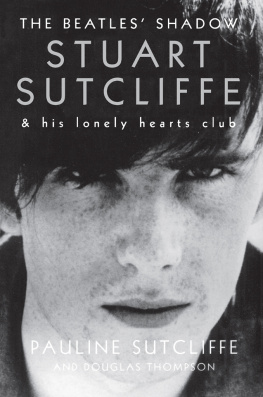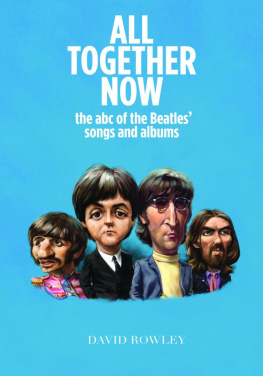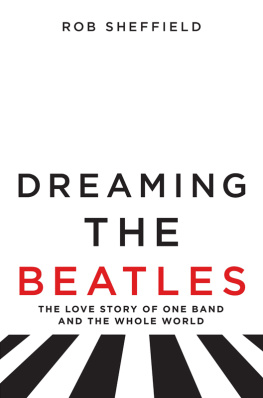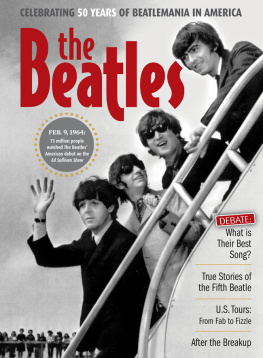INTRODUCTION: A LONG ENGAGEMENT
On 15 August 1960 a group of eight men and one woman drove out of Liverpool in a battered minibus on the first stage of a 600-mile journey to Hamburg. There was no ceremony to mark their departure, and the occasion was unremarked by all but a few close friends and family members who had come to wave them off. And yet the significance of this small event and all that followed it is almost without parallel in the history of music in the twentieth century. The nine people in the vehicle were local entrepreneur, manager and club owner Allan Williams, his wife Beryl and her brother Barry Chang, Williamss business partner and freelance musician Lord Woodbine, and five aspiring young musicians who had recently decided to change the name of their group from The Silver Beetles to something shorter John Lennon, Paul McCartney, George Harrison, Stuart Sutcliffe and Pete Best.
The trip had come about after German club-owner Bruno Koschmider had begun to recruit British groups to perform in his venues around the Reeperbahn in the St Pauli area of Hamburg in 1960. A chance meeting at The 2 Is coffee bar in London with Williams had resulted in Liverpools Derry and the Seniors being offered several weeks work in the city; they were instantly successful and Koschmider had asked for more groups from Merseyside. After discovering that his initial recommendations Cass and the Cassanovas, Rory Storm and the Hurricanes,Gerry and the Pacemakers were unavailable, Williams suggested The Beatles.
It was to be the first of five separate trips The Beatles would make to Hamburg over the next two and a half years and, in the decades since, the importance of their time there has been repeatedly acknowledged by each of the main protagonists. Williams recalls that soon they were all back in Merseyside... but now they had this great sound. The sound that was to go round the world.
As well as these first-hand observations, the numerous biographers and chroniclers of The Beatles similarly agree on the influential part that the visits to the city played in their story. Many such accounts contain a chapter or section called, simply, Hamburg; all offer identical conclusions that emphasize the dramatic transformation in the groups musical sound and performative style. In addition, three films have concentrated on the early 1960s as a dramatic, and pivotal, period in the history of The Beatles: Birth of The Beatles (dir. Richard Marquand, 1979) and Backbeat (dir. Iain Softley, 1994) focus explicitly on people and events in Hamburg; Nowhere Boy (dir. Sam Taylor-Wood, 2009) ends with Lennons pregnant words, as he prepares to leave Liverpool, Ill call when I get to Hamburg.
However, while there may be unanimity about the centrality of The Beatles experiences in Hamburg for their professional development, there have been relatively few sustained or detailed investigations of the causes, contexts and consequences of the changes that the city wrought in them. Furthermore, what analyses there are often dwell on the musical elements, and tend to over-look those equally important non-musical factors that help to explain the groups remarkable career and unprecedented success. The Beatles music is undoubtedly a key component in their achievements, but it is not the whole story; and in endeavouring to tell the story of The Beatles in Hamburg, it is necessary to consider the immediate environment as much as the group. In this respect, it is noteworthy that the few accounts that do give serious thought to such an approach are often written by German authors, for whom the Hamburg location is clearly a crucial element of that story rather than a random geographical location.
And while several memoirs have offered anecdotal narratives that emphasize sensational and disruptive incidents in which the Liverpool groups were involved, and which often reveal more about the author than the subject, it is also important to distinguish between the mundane reality of The Beatles and Hamburg as they were in the early 1960s, and the myths and legends that have grown up around them.group in new directions. Yet, at the time, many of these were little more than tentative choices or spontaneous opportunities, casually presented and informally received, that constituted daily life for The Beatles. In terms of the groups music, these included the early development of a songwriting partnership between John Lennon and Paul McCartney in order to supplement a demanding stage repertoire; shared appearances with US rocknroll stars including Little Richard and Gene Vincent; and the emergence of what some commentators have identified as the Hamburg sound. Impacts on group structure and membership included the expulsion from Germany of an underage George Harrison during The Beatles first engagement in the city, which temporarily threatened the groups future; Stuart Sutcliffes decision to leave the group, in order to study painting at the Hochschule fr Bildende Knste; the replacement of Pete Best by Ringo Starr shortly after the groups third visit to Hamburg; and the start of long-lasting collaborations with musicians such as Billy Preston and Klaus Voormann. Professionally, significant developments included The Beatles first proper studio recordings, produced by Bert Kaempfert in Hamburg; the severing of ties with Allan Williams and the formal appointment of Brian Epstein as their manager; the confirmation of a recording contract with Parlophone; and the chart entry of their first UK single (Love Me Do) while The Beatles were still in Germany. Key social and personal shifts included their adoption of a distinctive appearance, image and hairstyle, largely encouraged by Hamburg photographers Jrgen Vollmer and Astrid Kirchherr; their first exposure to a drug culture; and the sudden death of Stuart Sutcliffe. While attempts to imagine alternative pasts to construct counterfactual histories are always speculative, it is evident that few, if any, of these events could have happened in the way they did in any other setting than Hamburg.
In many ways, the fact that a group of young English musicians was invited to Germany was, in itself, surprising. Less then twentyyears earlier, the Luftwaffe was making regular bombing attacks on the docks and industrial plants of Merseyside; in return the raf would destroy much of Hamburg in raids that killed more than 50,000 of its citizens. The Beatles were born during the Second World War; so too were the majority of the audiences who came to see them around the Reeperbahn. And for their parents, the war was not a childhood memory but a period of profound loss, hardship and conflict against a clearly defined enemy. The postwar division of Germany into four zones of occupation (American, British, French and Russian), agreed by Franklin D. Roosevelt, Winston Churchill and Joseph Stalin at the Yalta Conference of 1945, the countrys partition into the German Democratic Republic (East Germany) and the Federal Republic of Germany (West Germany) in 1949, the continued presence of large numbers of Allied troops through the 1950s and the construction of the Berlin Wall in August 1961 served as regular reminders to the German population of their defeat. That representatives of the country which had inflicted that defeat were now being asked to supply its young people with musical entertainment was both poignant and ironic.

